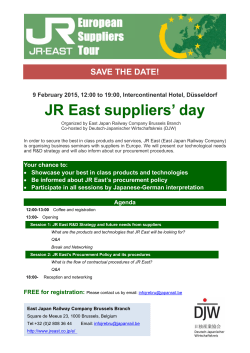
to the detailed programme
XXII edition From 14/9 to 11/12/2015 BRUSSELS POLICY ADVISOR & PROJECT CONSULTANT Held by UNIVERSITY OF LOUVAIN-LA-NEUVE & BELGIAN-ITALIAN CHAMBER OF COMMERCE INTERNATIONAL MASTER IN EUROPEAN STUDIES Policy Advisor and Project Consultant XXII Edition - Brussels, from 14th September to 11th December 2015 THE MASTER ............................................................................................................................ 2 THE PARTNERS IN A NUTSHELL........................................................................................... 3 Institute of European Studies of the Catholic University of Louvain (UCL) ............................ 3 European Desk of the Belgian-Italian Chamber of Commerce (CCBI) .................................... 3 TRAINING OBJECTIVES ........................................................................................................... 4 PROGRAMME........................................................................................................................... 5 Section I: The European construction and policies ................................................................ 5 Section II: Successful EU projects: design and management ................................................. 8 Section III: European Institutions, advisors and lobbyists .................................................... 12 WWW.EUROPEANMASTER.NET 1 INTERNATIONAL MASTER IN EUROPEAN STUDIES Policy Advisor and Project Consultant XXII Edition - Brussels, from 14th September to 11th December 2015 THE MASTER The International Master in European Studies is a post-graduate intensive master organised by the European Desk of the Belgian-Italian Chamber of Commerce in co-operation with the Institute of European Studies of the Catholic University of Louvain-La-Neuve. This Master is designed to provide students with an in-depth knowledge of EU institutions structure, functioning and policies, and with a sound understanding of the EU funding methods and Project Cycle Management tools and techniques. To this end, a thorough academic section is combined with hands-on practical work on European projects and tenders and with testimonials from policy advisors, project managers and EU officials. At the end of the course, participants will be able to coordinate and manage European projects and tenders according to the guidelines set by the European Commission and they will have had the opportunity to be introduced to several professionals from this sector of activities. Location – Brussels Length – 3 months Study load – Full time Editions – 2 per year (April – July and September – December) Language – English Admitted students – 30 (for each edition) Method – Lectures, seminars and group works WWW.EUROPEANMASTER.NET 2 INTERNATIONAL MASTER IN EUROPEAN STUDIES Policy Advisor and Project Consultant XXII Edition - Brussels, from 14th September to 11th December 2015 THE PARTNERS IN A NUTSHELL Institute of European Studies of the Catholic University of Louvain (UCL) The Catholic University of Louvain-La-Neuve was established in 1425. Since then, the UCL's mission to be a great European university has always been directed towards the future. Created in 1967, the Institute of European Studies (IEE) of the UCL carries out a wide range of activities in the field of education, research and services to civil society. Among its professors, it counts experts and academics from all over the world. The IEE is in charge of the academic part of the Master. www.uclouvain.be/euro European Desk of the Belgian-Italian Chamber of Commerce (CCBI) Created in 1950, the Belgian-Italian Chamber of Commerce (CCBI) is a non-profit association under Belgian law, recognized by the Italian Ministry for Economic Development. The quality of its services is attested by ISO 9001 certification. The CCBI offers a wide range of activities for the support of entrepreneurs and to foster business relationships between Italy and Belgium and provides enterprises, public entities, university and associations with a consultancy service on European procurements and EU project drafting. It also organizes high-quality training courses focused on European policies and funds. The European Desk drafts and manages, as leader or partner, several EU funded projects and tenders, mainly in the field of business support and training. In 2014 the European Commission acknowledged one of CCBI’s project as one of the best of the year. This project and others are presented to Master’s students to provide a first-hand experience on best practices in EU projects. www.ccitabel.com CCBI ON-GOING EUROPEAN PROJECTS (2013-2015) o ENPI – EU Partnership for Peace - Training and networking in Israel, Jordan and Palestine (leader) o ETF – Services to support ETF activities in Palestine (leader) o LLP – Erasmus – UNIKEY (partner) o LLP – Grundtvig – M-House (leader) o Erasmus for Young Entrepreneurs – OPEN-EYE 7 (leader) awarded by the EC as one of the best projects of the year. o CIP - Transnational tourism packages – TATRA (leader) o FIP - Canada outreach (main partner) WWW.EUROPEANMASTER.NET 3 INTERNATIONAL MASTER IN EUROPEAN STUDIES Policy Advisor and Project Consultant XXII Edition - Brussels, from 14th September to 11th December 2015 TRAINING OBJECTIVES The Master course lasts 3 months: it is an intensive, full-time programme, with an average of 4 hours of frontal lessons and 3 hours of individual study and practical work per day. The Master timetable is intensive to such an extent that it is the equivalent of a much longer Master's-type university programme. Therefore, the added value of our Master lies in the fact that it enables students to gain specific competences and skills in such a short period of time. The Master didactic method is based on a practice-oriented approach, which aims at transferring knowledge through a learning-by-doing process. Students develop specific competences and skills through workshops when they work in small groups of 5-6 people constantly supported by experienced consultants and trainers. All lectures are held in English. Thanks to this Master, students acquire specific skills on: o EU institutions' structure and functioning o European policy-making process o Lobbying and networking at EU level o EU financial framework and funding mechanisms o Thematic EU funding programmes (in the field of research, SMEs, culture, tourism, cooperation and development, energy & environment, social affairs, regional cooperation, etc.) o Project Cycle Management o Structuring the project idea and drafting a EU project o Project management, implementation and reporting o European procurements (EU tenders search and drafting of a tender offer) WWW.EUROPEANMASTER.NET 4 INTERNATIONAL MASTER IN EUROPEAN STUDIES Policy Advisor and Project Consultant XXII Edition - Brussels, from 14th September to 11th December 2015 PROGRAMME Section I: The European construction and policies Organized by the Institute of European Studies of the “Université Catolique de Louvain” The aim of this module is to provide the theoretical knowledge for Lobbying and Project Management. Here, the topic of the European construction is analysed from the historical, juridical and economic points of view. The main European policies and strategies are examined, in light of the new monetary agreements and also of the Community's recent enlargement. The political system of the European Union The aim of the course is to undertake a critical analysis of the political functioning of the institutions of the European Union. It examines how the EU institutions are appointed, how they function, their respective powers, how they interact with each other and with the national political systems that are increasingly involved in European policy making. It examines the process of institutional reform and the challenge of enlargement of the Union to Central and Eastern Europe. The EU legal order The aim of the course is to help the students to understand the Community as a legal order. The course is divided into six parts as below: - Institutional framework of the EC - Different sources of Community Law - Fundamental principles governing the relations between Community and national law - Principles governing the distribution of competences between the EU and its Member States - Methods used at the European level to develop policies. WWW.EUROPEANMASTER.NET 5 INTERNATIONAL MASTER IN EUROPEAN STUDIES Policy Advisor and Project Consultant XXII Edition - Brussels, from 14th September to 11th December 2015 The EU internal market The aim of this course is to give an overview of EU policies as concern the creation of an internal market. After an introduction about free trade, stages of integration and techniques, the four freedoms will be analysed with respect to the EU internal market: free movement of goods, services, persons and capitals. Afterwards the students will take a look in deep at the competition policy and competitions law. The course will close with an analysis of the abuses of dominant positions, in particular cases of state aid control and services of general interest. The EU budget This module begins with the history of the EU budget. It goes through the legal provisions concerning the EU budget and it examines the whole financial framework for the period 2014-2020. It points out the budgetary principles, including the compulsory and non-compulsory expenditures. It analyses the EU budget procedure and the approved budget for the year 2015. Finally the students will see how is the EU budget implemented and what are the new elements introduced by the Lisbon Treaty. The lobby in the EU Through this module, students acknowledge the importance of the lobbying activity to the European institutions as well as an update of who and why does lobby at the EU level. The course foresees the following main points: - Definition and origins of Lobbying; - Techniques of Lobbying; - Influencing Tools for local/regional authorities and networks in the EU Decision Making Process; - Tools for effective Lobbying in Brussels; - A concrete Lobby success story. WWW.EUROPEANMASTER.NET 6 INTERNATIONAL MASTER IN EUROPEAN STUDIES Policy Advisor and Project Consultant XXII Edition - Brussels, from 14th September to 11th December 2015 The EU’s external environmental and climate change policies This module aims to provide students with sound basis regarding the policies adopted by the European Union in the field of energy efficiency and renewable energy. In particular, students will analyse the 20-20-20 objective of the EU in the field of environment and energy. Europe of the regions The goal of this course is to describe the Europeanization process of local governments in Europe. This introduction of the course is dedicated to an overview of the generalization of governance within the EU countries. In a first part, the course will explore the influences of Europeanization on the organisation of European local governments and will put into perspective the institutional convergences at work all over Europe. The second part will provide a description of the evolution of the EU regional policy from its beginning until the new orientations. The external action of the EU The main objective of this session is to give a broad picture of the external relations of the European Union, in particular of the second pillar policies. The lecture focuses on the actors and decision-making processes of Common Foreign and Security Policy (CFSP)/ European Security and Defence Policy (ESDP), and highlights the challenges that the EU currently faces on the international stage. WWW.EUROPEANMASTER.NET 7 INTERNATIONAL MASTER IN EUROPEAN STUDIES Policy Advisor and Project Consultant XXII Edition - Brussels, from 14th September to 11th December 2015 Section II: Successful EU projects: design and management Organized by the Belgian-Italian Chamber of Commerce The second section focuses on learning the mechanisms, tools and criteria for designing and managing successful EU-funded projects and tenders. How to become an EU consultant, which ones are the main EU funding schemes, how to apply for an EU grant, how to answer to an EU procurement, etc. These are the queries that the core section of the Master course addresses to. The student learns through a learning-by-doing approach, with the support of case studies and interactive workshops. The lessons and the practical activities are held by professional EU Advisors, who have years of experience in planning, advising and providing technical assistance to SMEs, NGOs, think-tanks, public entities, and international organizations. Access to EU funding This first introductory module aims to provide students with the quality framework within which successful EU projects are drafted. The European Multiannual Financial Framework 2014-2020 is examined, as well as the characteristics of EU funding mechanisms. Students receive an understanding of direct and indirect funding, centralised and decentralised funding, co-funding and tendering procedures, EU loans. An overview of what is an EU project and key successful points of project drafting and management is provided. Focus is put on the building of the international consortia, a key point for EU projects: how to create strong links with valuable partners, characteristics of an EU consortium, partner selection, involvement, and coordination, etc. The module also aims to familiarize the student with key competencies and skills required for being an EU consultant and project manager. WWW.EUROPEANMASTER.NET 8 INTERNATIONAL MASTER IN EUROPEAN STUDIES Policy Advisor and Project Consultant XXII Edition - Brussels, from 14th September to 11th December 2015 Project Cycle Management – Structuring and Designing a successful project The aim of the course is to provide students with a structured method of designing a successful project. That includes the structuring on the project idea, starting with the problems’ analysis, objectives’ analysis, strategy and stakeholders’ analysis, concluding with the construction of the project’s logical framework. After having structured the project’s idea, the module goes on with the drafting of the application form. That includes understanding of relevant documents, such as call for proposals and guide for applicants, but also acquiring project drafting techniques, as well as some key project’s drafting tools, such as work plan and work packages, GANTT chart, communication and quality plans, etc. Finally, students will learn how to prepare the budget for an EU project. During these modules students will work in groups of 5-6 people on a real EU call for proposals, preparing an EU project. The workshop in groups aim, on one hand to allow students to gain practical experience on EU project drafting, on the other hand to develop team-work competencies, namely negotiation and communication skills, written and oral skills, organizational skills, flexibility and adaptation to multicultural working environments, ability to work in stressful situations and tight deadlines, and so forth. Project management and implementation The course has the aim to provide students with knowledge on how to manage an approved project. Participants will learn all the steps that follow the financing from the European Commission of a project. Namely, it will be analysed the negotiation phase, the initiation phase, the planning phase, the implementation phase, the monitoring and reporting phase, and the conclusion phase. This module will be followed by a group workshop on one of the project management phase, such as the simulation of a kick-off meeting. WWW.EUROPEANMASTER.NET 9 INTERNATIONAL MASTER IN EUROPEAN STUDIES Policy Advisor and Project Consultant XXII Edition - Brussels, from 14th September to 11th December 2015 EU Funding programmes in detail This module is dedicated to an in-depth overview on the different EU funding programmes. The aim of the module is to provide students with a comprehensive knowledge of the different EU funding opportunities, in terms of available budget, general and specific objectives of the programmes, beneficiaries, eligible entities, application rules, etc. These lectures aim to give to the future consultant a strong knowledge of the main EU funding opportunities, enabling the student’s ability to give advice to others on how to receive funding for a specific project idea. Classes are held by Project Managers experts in each specific funding programme; it is therefore a very practical explanation of the functioning of the programme, with an overview of the key players of the sector, and an update vision about trends and priorities. The following funding programmes will be presented and analysed in detail: - COSME, to improve the competitiveness and innovation of SMEs in Europe, including tourism, women entrepreneurship, industrial cooperation; - LIFE, to support actions for the environment and against climate change; - Erasmus+, to foster cooperation and improvement in education, youth and sport; - Structural and cohesion funds, to support EU regions throughout their economic development and integration; - Horizon2020, for research and development; ENPI, to support cooperation and development between Europe and its neighbours (i.e. Balkan area, Mediterranean area, Russia, …); - IPA, to support cooperation and development between Europe and candidate countries, as well as potential candidates; - DCI and EDF, to foster cooperation and development in Asia, Latin America, Africa; - And other pilot programmes… WWW.EUROPEANMASTER.NET 10 INTERNATIONAL MASTER IN EUROPEAN STUDIES Policy Advisor and Project Consultant XXII Edition - Brussels, from 14th September to 11th December 2015 European procurements and tendering procedures The module aims to provide students with the knowledge needed to monitor European tenders and to analyse calls for tenders published by European institutions, as well as to respond to a call with a comprehensive tender offer. The different procurement procedures are analysed, the Official Journal of the European Union is presented, the tools and techniques for building tender partnership and drafting technical and financial offer are presented. During this module students will work in groups of 5-6 people on a real EU procurement, preparing an EU tender offer. In detail, the students will learn to: - identify EU public procurement opportunities; - know the general tendering procedures set by the Financial Regulation in terms of EU tenders; - read and understand a call for tender; - understand contracting authority’s requirements, both in terms of documents and service requested; - build a strong partnership, responding to selection and award criteria; - prepare the administrative section of a tender, understanding the documents needed and who has to provide them; - draft the selection criteria section, technical offer and financial offer. WWW.EUROPEANMASTER.NET 11 INTERNATIONAL MASTER IN EUROPEAN STUDIES Policy Advisor and Project Consultant XXII Edition - Brussels, from 14th September to 11th December 2015 Section III: European Institutions, advisors and lobbyists Organized by the Belgian – Italian Chamber of Commerce Several seminars at the European institutions are organized in order to meet EU officers and to have a direct contact with who is working every day on EU policies and funding programmes. The following meetings will be organized: o Seminar at the European Parliament – Presentation of the political bodies and legislative powers of the Parliament by European civil servants. o Seminars at the European Commission – Presentations organized in different Directorates General of the European Commission (according with the availability of the DGs) on topic related to the DG’s management. o Seminar at the Council of the European Union – Presentation of the role of the Council of the European Union held by a civil servant from the Council’s General Secretariat. This third section aims also to provide students with a wide vision of the different realities operating on the Brussels area in the European field. Meetings with experts, advisors and lobbyists are therefore organized. Some examples (meetings may vary accordingly with the availability of the expert): Ernst&Young – Consultancy on European grants and incentives; the European Youth Forum – The federation of European youth organisations; CEPS – Centre for European Policy Studies; European Young Innovators Forum; EASME – the Executive Agency for SMEs; EACEA - the Education, Culture and Audiovisual Executive Agency; other project managers, policy advisors, and EU officials. WWW.EUROPEANMASTER.NET 12 INTERNATIONAL MASTER IN EUROPEAN STUDIES Policy Advisor and Project Consultant XXII Edition - Brussels, from 14th September to 11th December 2015 European Desk, Master and Training Belgian-Italian Chamber of Commerce Avenue Henri Jaspar 113 1060 – Brussels Tel: 0032 2 534 45 79 Fax: 0032 02 230 21 72 www.europeanmaster.net info@europeanmaster.net WWW.EUROPEANMASTER.NET 13
© Copyright 2025









